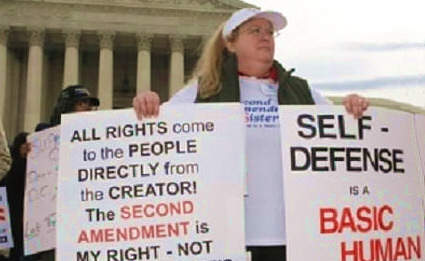

The Washington Post Ignores Right to Bear Arms
![]()

Dean Weingarten. February 1st, 2018
Article Source
In an article about shall issue carry permits in Washington, D.C., the authors, Peter Hermann and Peter Jamison, ignore half of the rights contained in the Second Amendment. It is rather odd, considering it is the main topic of their article.
The U.S. Court of Appeals for the D.C. Circuit struck down the "may issue" law in D.C. specifically. Here is an excerpt from Wrenn that shows how strong the opinion is. From Wrenn v. D.C.:
Our first question is whether the Amendment's "core" extends to publicly carrying guns for self-defense. The District argues that it does not, citing Heller I's observation that "the need for defense of self, family, and property is most acute" in the home. Id. at 628. But the fact that the need for self-defense is most pressing in the home doesn't mean that self-defense at home is the only right at the Amendment's core. After all, the Amendment's "core lawful purpose" is self-defense, id. at 630, and the need for that might arise beyond as well as within the home. Moreover, the Amendment's text protects the right to "bear"as well as "keep"arms. For both reasons, it's more natural to view the Amendment's core as including a law-abiding citizen's right to carry common firearms for self-defense beyond the home (subject again to relevant "longstanding" regulations like bans on carrying "in sensitive places"). Id. at 626.
This reading finds support in parts of Heller I that speak louder than the Court's aside about where the need for guns is "most acute." That remark appears when Heller I turns to the particular ban on possession at issue there. By then the Court has spent over fifty pages giving independent and seemingly equal treatments to the right to "keep" and to "bear," first defining those "phrases" and then teasing out their implications. See id. at 570-628. In that long preliminary analysis, the Court elaborates that to "bear" means to "'wear, bear, or carry . . . upon the person or in the clothing or in a pocket, for the purpose . . . of being armed and ready for offensive or defensive action in a case of conflict with another person.'" Id. at 584 (quoting Muscarello v. United States, 524 U.S. 125, 143 (1998) (Ginsburg, J., dissenting)). That definition shows that the Amendment's core must span, in the Court's own words, the "right to possess and carry weapons in case of confrontation." Id. at 592 (emphasis added).
But the Peter and Peter ignore the obvious. From the Washington Post article:
City officials have long fought efforts to chip away at the District's strict controls since the high court used a local case in 2008 to declare that an individual has a right to gun ownership.
(snip)
City officials decided not to appeal to the Supreme Court because of the potential national implications. An unfavorable ruling could have weakened gun control regulations in states such as California, New York and Maryland.
(snip)
"I wasn't going to try to manufacture a reason. It's the Bill of Rights. You shouldn't need a reason," he said recently, referring to the Second Amendment right to own a firearm.
It is almost humorous the length Peter and Peter of the post go to not mention the right to bear arms. They specifically mention that the D.C. government will not appeal the case, because they fear the Supreme Court will uphold the right (to bear arms).
The court case that mandated the change in D.C. law, was all about the right to bear arms. But the right to bear arms is conspicuously absent from the Washington Post article. Perhaps an editor removed it as Post policy.
We may never know.
©2018 by Dean Weingarten: Permission to share is granted when this notice and link are included. Gun Watch
![]()

























